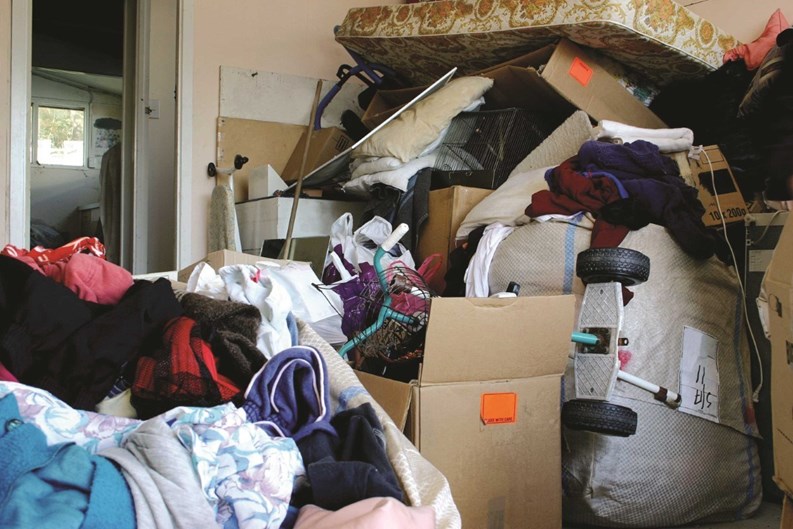People have a right to their privacy, and to be able to enjoy their own homes. Which means others don’t have a right to infringe upon that enjoyment, unless it’s unavoidable (such as in the case of a street renovation project). If only the disruptions of community living were that infrequent—but they’re not.
Occasionally, a resident’s behavior adversely affects others in the community, and the behavior becomes an issue which must be dealt with by management. Whether it’s a hoarder, an elderly person with medical problems, a mentally ill resident or another resident in a similarly difficult predicament, management and the board must tread cautiously.
Still, in such cases, the powers that be must go there. If the board of trustees fails to act, they could be neglecting their duty as board members and might end up being held liable for it. Besides, cases of residents with difficulties aren’t insurmountable; often they can be worked out to benefit everyone. But to do so, management must rely on diplomacy, tact, sensitivity to the privacy of residents, and an adherence to the letter of the law.
Sticky Scenarios
The conundrum may start with a foul odor creeping into the hallway, which residents gradually notice, until they can’t ignore it. Realizing the smell isn’t going away, they complain about the odor to building staff. Other times, the problem with a resident is not the smell from his or her unit but the unsafe conditions within it. These conditions might not have any telltale signs, such as smells, or junk piled up against a window and visible from the street.
And sometimes, the problem in the unit is discovered by the building maintenance man. When he tries to access a pipe that he needs to fix, he can’t gain access to do the repair because of the all of the stuff jam-packed into the unit.
Consider this true-life scenario: A resident decided to rent a room to a homeless man, whose belongings contained bedbugs that quickly infested the unit—and other units—with the insects. Naturally, residents complained, and began to point an accusing finger at the neighbor who moved the homeless person into the building.
In a rather scarier true-life scenario, the offending party was a mentally unstable man who ranted and raved at the top of his lungs at all hours, yelling at the ceiling to the discomfort of his upstairs neighbor, whom he was convinced was trying to control his mind. The neighbor complained to management about the ruckus, and naturally management got involved.
Whatever the situation, when difficult residents must be dealt with, the rights of everyone in the community have to be observed. To protect those rights, experts say a methodical approach should be taken when dealing with difficult residents. Documentation is essential; a formal record of infractions should be made throughout.
Establish a Procedure
Some companies have a process they follow in these dealings. For example, at Great North Property Management in Exeter, New Hampshire, after receiving word of problems with a difficult resident, the manager personally visits the offending apartment and tries to talk with the resident. If the resident answers the door (often in such cases they will not), the manager can inform him of the problem. The manager might also possibly have a “look-see”—or use his or her nose to determine if there’s any foundation to odor complaints.
If the resident isn’t home or won’t answer the door, the manager will send them a letter about the problem, with an offer to set up a time for the resident and property manager to meet and talk about rectifying the issue, says Lou Gargiulo, president of New Hampshire-based Great North Property Management, which manages 200 associations totaling over 13,000 units throughout New England.
“Typically, the problem comes up as a result of neighbors complaining. Many times it’s from an odor,” Gargiulo says.
Sometimes the situation is a sad one—a hard luck case of some kind. Even so, it must be resolved.
“I’ve been involved in situations where there are hoarders, and you can’t do maintenance in the apartment. It can be a fire hazard,” says attorney Diane Rubin, a partner with the Boston-based law firm of Prince Lobel Tye, LLP. “A lot of times it’s elderly people who can’t take care of themselves well, and there’s nobody checking in on them.”
Regardless of the specifics of the case, it’s important for the property manager to document everything from the nature and severity of the problem to the first complaints, to attempts to contact the offending resident and/or communicate with the resident. In creating this paper trail, the property manager and the association will protect themselves in the event that the problem becomes a legal matter. It’s important to remember that residents—even those creating a literal stink—have the right to respond to property neglect accusations, and also often are given the chance to remediate those conditions.
While your condo community might not have had such problems, the potential severity of them cannot be overstated. More and more often, older residents in declining health are continuing to live in their homes without any help, when they really can’t care for themselves, says attorney Janet Aronson, a partner with the law firm of Marcus, Errico, Emmer & Brooks, P.C. in Braintree, Massachusetts.
“The conditions of a unit can get so bad you need an environmental company with workers in hazmat suits to come in. It gets really nasty—it’s garbage, it’s food, and sometimes, human waste,” Aronson says. “It can be more of a problem in the summer. That’s when the smell becomes noticeable.”
In such cases, if the offending resident has family, it’s recommended that the property manager contact them to see if they can help. Sometimes, that will work, but not always.
“It depends on the resident—how with it they are,” Aronson says. “A lot of times you have to get a court order to clean out the unit.”
While some property managers might feel more comfortable initially approaching the problem resident by knocking on their door, a meeting in the property manager’s office could be ideal. Since it’s on more or less neutral territory, while the resident’s apartment is the problem source, that office meeting might proceed more smoothly.
Inaction is Not an Option
But if the resident isn’t open to communicating with management about the problem, it’s time to consult an attorney. There really is no other choice at that point.
“By the time a problem gets to a lawyer, a property manager has been diligent in trying to solve it amicably,” Rubin says.
An attorney will explain to the board and property manager the specifics of the association’s legal right to have access to the unit The lawyer will explain how to provide reasonable notice to the resident that building staff (or others, such as contractors) will be coming to enter the unit, and how to give that notice in writing.
“The association has the right to inspect the unit. Lots of times, one-on-one personal contact helps… But if they’re not open to help, a geriatric social worker could become involved” in such a case as one involving an elderly person, Rubin says. “Or a conservator could be appointed by the court for the resident.”
Though it’s no one’s favorite task to confront a troubled resident whose hoarding has spilled out into the hallway, or whose unsanitary living conditions have resulted in vermin infestation in the building, failing to do so isn’t a choice. The association board is obligated to take action; not doing something is tantamount to not doing their jobs as elected officials of the community. They have a responsibility to manage the property.
“Condo living, for better or worse, is communal living. If someone is not being respectful, you have to look at the governing documents very closely to see what they say,” Rubin says. “Most say something about residents’ right to the quiet enjoyment of their apartments.”
Generally, infractions that might be characterized as coming from so-called ‘problem’ residents are of two types: health and safety violations (which are clearly a responsibility the board must handle); and unit owner-to-unit owner, which also is part of the board’s management bailiwick.
Failing to act, while technically illegal (since it ignores the board’s responsibilities), also could make matters worse. In the case of the resident with the formerly homeless roommate who’d moved in with bedbugs, the critters had made it into others’ apartments. The local municipality refused to get involved in the matter, even after the resident wouldn’t allow the property manager into the condo unit to inspect.
Management had to take legal action in that case, in order to evict the tenant, Gargiulo explains. The association sought relief from the courts, and got a Writ of Possession. That allowed the manager to bring a sheriff to escort the resident out of the unit and lock him out of it.
Elder Care or Social Services
If the resident’s infractions are health-related, local health department officials can be called about the matter. The department may or may not choose to become involved, depending upon the circumstances, and the resources of the department. Elder services are offered by some local governments but not all, and can be helpful in such geriatric cases. And while some local governments have geriatric social workers who can help, that’s only if the troublesome resident is willing to take that help.
When such residents are causing problems and are brought to a board’s attention, not acting can be at the very least a breach of the board’s duty. At worst, it could make the board legally liable if there are losses or other harms proved by angry residents who feel left out to dry by their elected leaders. It is the board’s responsibility not only to ensure residents’ ability to quietly enjoy their homes, but also to work to ensure the property is safe and holding its value.
But the rights of unit owners are not diminished in any case. People still have a right to their privacy, even if their smelly unit has become the topic of conversation for many of the community’s residents. In such instances, the offending party’s name cannot be publicized, lest the association be sued for slander.
So while a board may have to discuss the problem of such a resident during a board meeting, the discussion must be held in private, during the executive session of the board. The information cannot be publicized in an open meeting, or in a newsletter, email communication to all residents, on a website or on an old fashioned cork and wood bulletin board.
“Privacy is very important. Each unit owner owns the interior of their unit. That’s why you are very methodical, clearly documenting things, and escalating to a lawyer only when the people won’t respond,” Rubin says.
Jonathan Barnes is a freelance writer and a frequent contributor to New England Condominium.







Comments
Leave a Comment